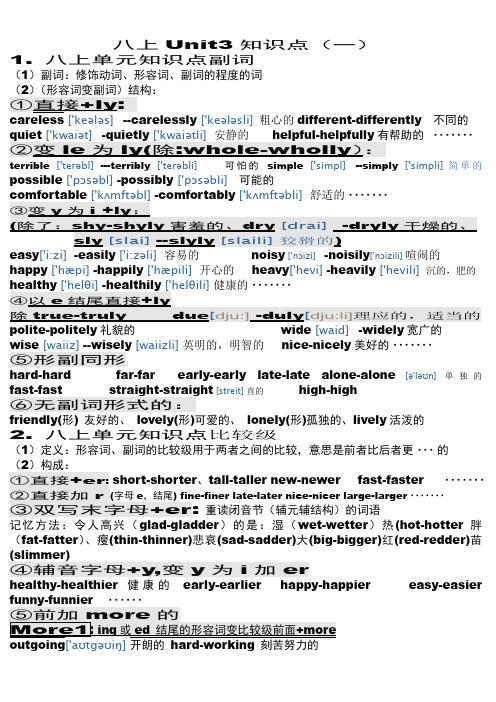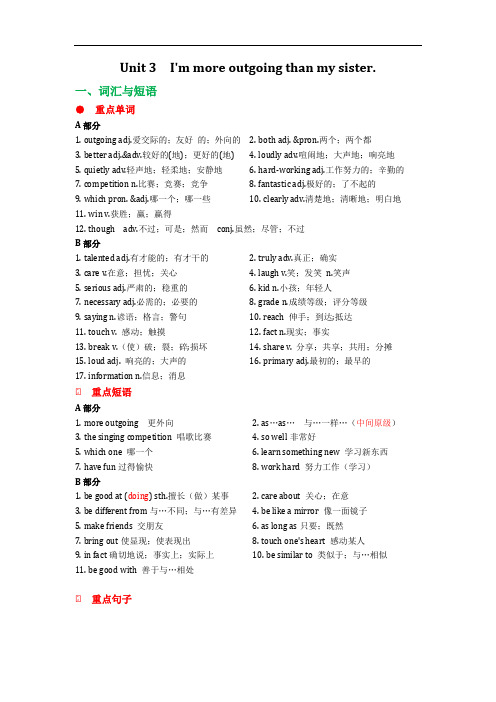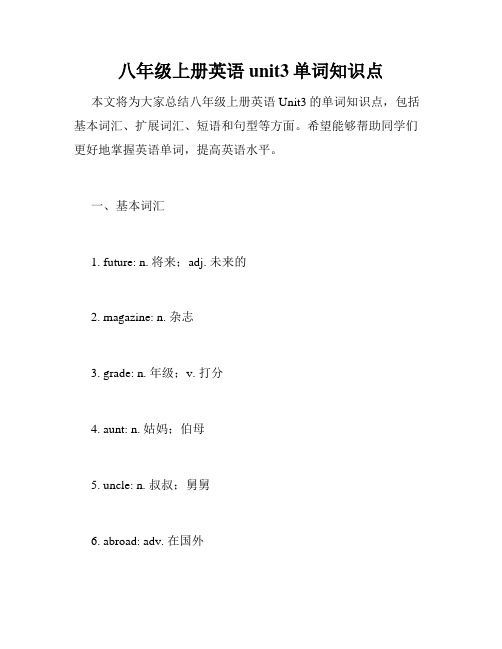年八年级上册英语第三单元知识点归纳
八年级上册英语第三单元知识点详解

Unit3 I’m more outgoing than my sister 一、重点短语归纳1.talk about谈论2.in some ways在某些方面3.more than超过,多于4.things in common共同之处5.be good at sth.=do well in sth.擅长于sth.6.(not) as…as…(不)如……一样……7 have fun doing sth.享受做某事的乐趣8.make sb. do sth.让某人做某事9.look the same 看起来一样10.talk to/with和……谈话11.stop doing sth.停止做某事12.stop to do sth停下来接着做某事13.begin / start with以……开始14.end with以……结束15.in the middle of在……中间16.a swimming pool游泳池17.on the other hand =on the opposite 另一方面(边)18. after that 自那以后19.be good with=get on well with和……相处得好20.around China=all over China全中国e sth. to do sth.=do sth. with sth.用……来做……22.As you can see.正如你所见到的那样.23.more than one sister 不只一个姐妹24.have good grades 有好成绩25.opposite views and interests 对立的观点和兴趣26.enjoy telling jokes 喜欢讲笑话27.stay at home and read 呆在家里看书28.get the job 得到这份工作29.do the same thing as sb. 跟某人做一样的事情30.each other 互相31.enjoy oneself = have great fun = have a good time玩得高兴32.spend sometime [in] doing sth. = spend sometime on sth.花时间做某事33.plan to do sth. 计划做某事34.on a farm 在农场35. more outgoing更外向36. the singing competition唱歌比赛37. be similar to与……相像的/类似38. be the same as和……相同;与……一致39. be different from与……不同40. care about关心;介意41.be like a mirror像一面镜子42. the most important最重要的43. as long as只要;既然44. bring out使显现;使表现出45. get better grades取得更好的成绩46. reach for伸手取47. in fact事实上;实际上48. make friends with sb和某人交朋友49. touch one’s heart感动某人50. be talented in music有音乐天赋51. be good at doing sth擅长做某事52. be good with善于与……相处53.play the drums打鼓54.run fast跑得快55.jump high跳得高56.work as hard as sb.和某人一样努力工作57.get up early早起床58.sing well唱得好59.the one with shorter hair头发较短的那个60.primary school 小学二.重点语法1. I’m more outgoing than my sister. 我比我妹妹更外向。
八年级上册英语unit三知识点总结

八年级上册英语unit三知识点总结在八年级上册英语课程中,unit三是一个重要的单元。
本文将总结unit三的主要知识点,包括语法、词汇和阅读理解等方面。
一、语法1.现在进行时现在进行时表示现在正在进行的动作。
构成:be+现在分词(-ing)。
如:I am reading a book.(我正在看书。
)2.一般将来时一般将来时表示将来的动作或状态。
构成:will+动词原形。
如:I will go shopping tomorrow.(我明天去购物。
)约定时间或计划安排时用现在进行时+表示将来时间。
如:We are meeting at six tomorrow evening.(我们明天傍晚六点见面。
)3.被动语态被动语态表示动作的承受者,通常情况下使物体作主语,谓语动词用be+过去分词(-ed)。
如:The book was written by him.(这本书是他写的。
)二、词汇1.常见动词play(玩)、walk(散步)、jog(慢跑)、cycle(骑自行车)、swim(游泳)、dance(跳舞)、sing(唱歌)、listen(听)、draw(画画)、read(读)、write(写)、speak(说话)、learn (学习)、teach(教)、watch(看)等。
2.常见地点school(学校)、park(公园)、cinema(电影院)、library (图书馆)、supermarket(超市)、hospital(医院)、museum (博物馆)、post office(邮局)等。
3.常见习惯描述词汇always(总是)、usually(通常)、often(经常)、sometimes (有时)、not often(不经常)、hardly ever(很少)、never(从不)等。
三、阅读理解本单元阅读理解主要涉及四则运算和图表解释,详见教材P39和P40。
四、写作本单元写作主要涉及书信和短文。
八年级上册英语第三单元知识点

八年级上册英语第三单元知识点一、重点词汇1、 outgoing 形容词,意为“外向的”例如:She is more outgoing than her sister (她比她姐姐更外向。
)2、 better 形容词或副词的比较级,意为“更好的(地);较好的(地)”例如:He sings better than me (他唱得比我好。
)3、 loudly 副词,意为“大声地;高声地;花俏地”例如:Speak loudly, please (请大声说。
)4、 quietly 副词,意为“安静地;悄悄地;平静地”例如:He is sitting quietly (他正安静地坐着。
)5、 hardworking 形容词,意为“工作努力的;辛勤的”例如:She is a hardworking student (她是一个勤奋的学生。
)6、 competition 名词,意为“竞赛;比赛;竞争”例如:There is a singing competition this week (这周有一场歌唱比赛。
)7、 fantastic 形容词,意为“极好的;了不起的”例如:The movie is fantastic (这部电影太棒了。
)8、 which 代词,意为“哪一个;哪一些”例如:Which book do you like? (你喜欢哪本书?)9、 clearly 副词,意为“清楚地;清晰地;明白地”例如:I can see clearly now (我现在能看清楚了。
)10、 win 动词,意为“获胜;赢;赢得”例如:Our team won the game (我们队赢了比赛。
)二、重点短语1、 care about 关心;在意例如:He doesn't care about his clothes (他不在乎他的衣服。
)2、 as long as 只要;既然例如:You can come as long as you are free (只要你有空就可以来。
八年级上unit 3 知识点总结

八年级上unit 3 知识点总结八年级上unit 3主要讲述的是时间的表达、日程安排、习惯和规律以及日常活动的表述等方面的内容。
本文将对这些知识点进行详细的总结。
一、时间的表达在英语中表示时间有多种方式,可以用基本的时间词汇,如day、week、month、year等,也可以用具体的时间点,如9o’clock 或 Monday morning等。
此外,还可以用一些特殊的表达方式,如定语从句、状语从句和介词短语等。
1. 使用基本的时间词汇在使用基本的时间词汇时,需要注意以下几点:(1)单复数的使用。
如:three days、two weeks。
(2)使用不定冠词。
如:a year、an hour等。
(3)表示“在(某一个)时间之前”用介词“before”,表示“在(某一个)时间之后”用介词“after”。
如:before 7 o’clock、after Monday。
2. 使用具体的时间点在使用具体的时间点时,需要注意以下几点:(1)使用正确的时间短语。
如:in the morning、in the evening、in the afternoon等。
(2)使用正确的介词。
如:at、in、on等。
如:at 9 o’clock、in May。
(3)表示星期几时需要使用大写字母。
如:Today is Monday.3. 特殊的时间表达方式(1)定语从句。
如:The day when I met him was a memorable day.(2)状语从句。
如:As soon as I finish my homework, I will go to bed.(3)介词短语。
如:on the way、at the moment、in the middle of等。
二、日程安排在日程安排方面,需要掌握一些基本的时间表达方式,如:(1)What’s your plan for tomorrow?(你明天有什么计划?)(2)What are you going to do this afternoon?(你下午要干什么?)(3)I’ll be busy tomorrow.(我明天会很忙。
Unit3知识点 人教版英语八年级上册

八上Unit3知识点(一)1.八上单元知识点副词(1)副词:修饰动词、形容词、副词的程度的词①直接+ly:careless ['keələs] --carelessly ['keələsli] 粗心的different-differently 不同的quiet ['kwaiət] -quietly ['kwaiətli] 安静的helpful-helpfully有帮助的·······:②变le为ly(除:whole-wholly)terrible['terəbl]---terribly ['terəbli]可怕的simple['simpl] --simply ['simpli] 简单的possible ['pɔsəbl] -possibly ['pɔsəbli]可能的comfortable ['kʌmftəbl] -comfortably ['kʌmftəbli] 舒适的·······③变y为i +ly:(除了:shy-shyly害羞的、dry [drai] -dryly干燥的、sly [slai] --slyly [slaili] 狡猾的)easy['i:zi] -easily ['i:zəli] 容易的noisy ['nɔizi] -noisily['nɔizili] 喧闹的happy ['hæpi] -happily ['hæpili] 开心的heavy['hevi] -heavily ['hevili]沉的,肥的healthy['helθi]-healthily['helθili]健康的·······④以e结尾直接+ly除true-truly due[dju:] -duly[dju:li]理应的,适当的polite-politely礼貌的wide [waid] -widely宽广的wise [waiiz] --wisely [waiizli] 英明的,明智的nice-nicely美好的·······⑤形副同形hard-hard far-far early-early late-late alone-alone[ə'ləʊn]单独的fast-fast straight-straight [streit] 直的high-high⑥无副词形式的:2.八上单元知识点比较级(1)定义:形容词、副词的比较级用于两者之间的比较,意思是前者比后者更···的(2)构成:①直接+er: short-shorter、tall-taller new-newer fast-faster ·······②直接加r (字母e,结尾) fine-finer late-later nice-nicer large-larger·······③双写末字母+er:重读闭音节(辅元辅结构)的词语记忆方法:令人高兴(glad-gladder)的是:湿(wet-wetter)热(hot-hotter胖(fat-fatter)、瘦(thin-thinner)悲哀(sad-sadder)大(big-bigger)红(red-redder)苗(slimmer)④辅音字母+y,变y为i加erhealthy-healthier健康的early-earlier happy-happier easy-easier ⑤前加more的More1: ing或ed 结尾的形容词变比较级前面+moreoutgoing['aʊtɡəʊiŋ]开朗的hard-working 刻苦努力的interesting ['intrəstiŋ]—interested ['intrəstid] (有趣的)surprising [sə'praiziŋ] --surprised [sə'praizd] (惊讶的)relaxing [ri'læksiŋ]—relaxed [ri'lækst] (放松的)boring-bored(枯燥的) tiring ['ta iər iŋ]—tired ['taiəd] (劳累的) exciting—excited(刺激的) talented ['tæləntid]有才能的·······More2:形容词后+ly 变成副词的前面+morequickly快的carefully 小心的quietly['kwaiətli] 安静的seriously ['sɪəriəsli]严肃的 happily 快乐的luckily 幸运的·······注意:friendly—friendlier lovely—lovelier lonely ['ləʊnli] --- lonelier ['ləʊnliə] More3:多音节词和部分双音节词(1)7个字母以及7个字母以下的词语:比较级加more的顺口溜:现代流行怕细心modern ['mɔdn]popular['pɔpjələ] afraid[ə'freid]careful['keəfl]严紧(紧张的)诚实用耐心serious ['siəriəs] nervous[ˈnɜ:vəs]honest ['ɔnist] useful(或useless) patient ['peiʃnt]经常(正常的)(常见的)积极有帮助often['ɔfn] normal[ˈnɔ:ml] common/kɔmən/ active ['æktiv]helpful(helpless)基本出名古得开自然无害地加fun和upset (沮丧的)basic ['beisik] 、famous、ancient[ˈe inʃənt]open ['əʊpən] natural[ˈnætʃrəl]harmless (harmful)fun upset (2)8个字母以及8个字母以上的词的比较级全部加more ⑥不规则的特殊记忆well -----better bad或badly--------worse ][wə:s] little—----less far---—farther或further['fə:ðə] 更远的八上单元知识点①“····比较级than····”:····比···“···数字times+比较级+than····”:···是···的几倍(一倍once两倍twice+times)···比较级than any other + 单数名词:比其他任何都··今早我起得比我妈早。
最全面人教版八年级上册英语第三单元知识点归纳总结

最全面人教版八年级上册英语第三单元知识点归纳总结第三单元主要介绍了八年级上册英语中的一些重要知识点。
本文将对这些知识点进行归纳总结,以帮助同学们更好地理解和掌握。
一、重点词汇1. soccer(n.):足球2. ping-pong(n.):乒乓球3. guitar(n.):吉他4. violin(n.):小提琴5. piano(n.):钢琴6. drums(n.):鼓7. play(v.):玩,踢8. play soccer/ ping-pong/ the guitar/ the violin(短语):踢足球/打乒乓球/弹吉他/拉小提琴9. play the piano/ the drums(短语):弹钢琴/打鼓10. listen to(v.):听11. listen to music(短语):听音乐12. show(v.):展示13. show sb. sth.(短语):展示给某人某物14. music(n.):音乐15. musician(n.):音乐家16. concert(n.):音乐会17. kind(adj.):友好的,和蔼的18. polite(adj.):有礼貌的,客气的19. patient(adj.):有耐心的20. helpful(adj.):乐于助人的二、重点句型1. What can you do?(你会做什么?)- I can play soccer/ ping-pong/ the guitar/ the violin/ the piano/ the drums.(我会踢足球/打乒乓球/弹吉他/拉小提琴/弹钢琴/打鼓。
)2. Can you play the piano?(你会弹钢琴吗?)- Yes, I can. / No, I can't.(是的,我会。
/不,我不会。
)3. Who can play the drums?(谁会打鼓?)- Li Lei can play the drums.(李雷会打鼓。
最全面人教版八年级上册英语第三单元知识点归纳总结

Unit 3 I'm more outgoing than my sister.一、词汇与短语●重点单词A部分1.outgoing adj.爱交际的;友好的;外向的2.both adj. &pron.两个;两个都3.better adj.&adv.较好的(地);更好的(地)4.loudly adv.喧闹地;大声地;响亮地5.quietly adv.轻声地;轻柔地;安静地6.hard-working adj.工作努力的;辛勤的petition n.比赛;竞赛;竞争8.fantastic adj.极好的;了不起的9.which pron. &adj.哪一个;哪一些10.clearly adv.清楚地;清晰地;明白地11.win v.获胜;赢;赢得12.though adv.不过;可是;然而conj.虽然;尽管;不过B部分1.talented adj.有才能的;有才干的2.truly adv.真正;确实3.care v.在意;担忧;关心ugh v.笑;发笑n.笑声5.serious adj.严肃的;稳重的6.kid n.小孩;年轻人7.necessary adj.必需的;必要的8.grade n.成绩等级;评分等级9.saying n.谚语;格言;警句10.reach 伸手;到达;抵达11.touch v. 感动;触摸12.fact n.现实;事实13.break v.(使)破;裂;碎;损坏14.share v. 分享;共享;共用;分摊15.loud adj. 响亮的;大声的16.primary adj.最初的;最早的rmation n.信息;消息● 重点短语A部分1.more outgoing 更外向2.as…as…与…一样…(中间原级)3.the singing competition 唱歌比赛4.so well非常好5.which one 哪一个6.learn something new 学习新东西7.have fun过得愉快8.work hard 努力工作(学习)B部分1.be good at (doing) sth.擅长(做)某事2.care about 关心;在意3.be different from与…不同;与…有差异4.be like a mirror 像一面镜子5.make friends 交朋友6.as long as只要;既然7.bring out使显现;使表现出8.touch one's heart 感动某人9.in fact确切地说;事实上;实际上10.be similar to 类似于;与…相似11.be good with 善于与…相处● 重点句子A部分1.That's Tara, isn't it? 那是塔拉,不是吗?2.Both Sam and Tom can play the drums, but Sam plays them better than Tom.萨姆和汤姆都会敲鼓,但是萨姆比汤姆敲得要好一些。
八年级上册英语三单元知识点

八年级上册英语三单元知识点一、重点单词1. outgoing- 形容词,意为“外向的;友好的;爱交际的”。
例如:My sister is more outgoing than me.(我的姐姐比我更外向。
)2. both- 形容词,意为“两者都”;代词,意为“两者;双方”。
例如:Both of them are students.(他们俩都是学生。
)Both Tom and Jerry like ice - cream.(汤姆和杰瑞都喜欢冰淇淋。
)3. better- 形容词或副词good/well的比较级,意为“更好的(地);较好的(地)”。
例如:He is feeling better today.(他今天感觉好多了。
)4. loudly- 副词,意为“喧闹地;大声地;响亮地”。
例如:Don't talk so loudly in the library.(不要在图书馆这么大声说话。
)5. quietly- 副词,意为“轻声地;轻柔地;安静地”。
例如:He closed the door quietly.(他轻轻地关上门。
)6. hard - working- 形容词,意为“工作努力的;辛勤的”。
例如:My mother is a hard - working woman.(我的妈妈是一个勤劳的女人。
)7. competition- 名词,意为“比赛;竞赛;竞争”。
例如:There will be a singing competition next week.(下周将有一场歌唱比赛。
)8. fantastic- 形容词,意为“极好的;了不起的”。
例如:We had a fantastic time at the party.(我们在聚会上玩得非常开心。
)9. which- 代词,意为“哪一个;哪一些”,可引导特殊疑问句或定语从句。
例如:Which book do you like best?(你最喜欢哪本书?)10. clearly- 副词,意为“清楚地;清晰地;明白地”。
八年级上册英语Unit3的知识点归纳

八年级上册英语Unit3的知识点归纳八年级上册英语Unit3的知识点归纳在我们上学期间,相信大家一定都接触过知识点吧!知识点就是“让别人看完能理解”或者“通过练习我能掌握”的内容。
还在为没有系统的知识点而发愁吗?以下是小编帮大家整理的八年级上册英语Unit3的知识点归纳,仅供参考,大家一起来看看吧。
八年级上册英语Unit3的知识点归纳1Unit3 I’ re utging than sister.re utging更外向as…as…与……一样…… the singing cpetitin唱歌比赛be siilar t与……相像的/类似的 the sae as和……相同;与……一致 be different fr与……不同care abut关心;介意 be lie a irrr像一面镜子 the st iprtant最重要的as lng as只要;既然bring ut使显现;使表现出get better grades取得更好的成绩reach fr伸手取in fact事实上;实际上ae friends交朋友the ther其他的tuch ne’s heart感动某人 be talented in usic有音乐天赋be gd at擅长…… be gd with善于与……相处have fun ding sth.享受做某事的乐趣 be gd at ding sth擅长做某事 ae sb. d sth.让某人做某事want t d sth.想要做某事 as+ad./adv.的原级+as 与……一样……It’s+ ad.+fr sb. t d sth. 对某人来说,做某事……的。
形容词和副词的比较级、最高级大多数形容词和副词有三个等级:1)原级(不作比较),修饰词ver,s,t,prett,reall;2)比较级,表示“较……”或“更……”的意思(两者之间进行比较), 标志词than,A r B,f the tw, 修饰词uch,a lt,a little;3)最高级,表示“最……”的意思(三者或三者以上作比较),形容词最高级前面一般要加定冠词the,后面可带in(f)短语来什么比较的范围。
八上英语Unit 3笔记整理

八上英语Unit 3笔记整理【重点单词】①outgoing ['aʊtɡəʊɪŋ] adj. 外向的②better ['betə(r)] adj. & adv.(good和well的比较级) 较好的(地);更好的(地)③loudly ['laʊdli]adv. 喧闹地,大声地;响亮地④quietly ['kwaɪətli]adv. 轻声地;轻柔地;安静地⑤hard-working [ˌhɑː(r)d'wɜːkɪŋ]adj. 工作努力的;辛勤的⑥competition [ˌkɒmpə'tɪʃn], [ˌkɑːmpə'tɪʃn]n. 比赛;竞赛;竞争⑦fantastic [fæn'tæstɪk]adj. 极好的;了不起的which [wɪtʃ] pron. & adj. 哪一个;哪一些⑧clearly ['klɪəli], ['klɪrli]⑨adv. 清楚地;清晰地;明白的win [wɪn] v. 获胜;赢;赢得though [ðəʊ] adv. 不过;可是;然而conj. 虽然;尽管;不过talented ['tæləntɪd] adj. 有才能的;有才干的truly ['truːli] adv. 真正;确实care [keə] , [ker] v. 在意;担忧;关心care about 关心;在意⑩serious ['sɪəriəs], ['sɪriəs]adj. 严肃的;稳重的mirror ['mɪrə(r)] n. 镜子kid [kɪd] n. 小孩;年轻人as long as 只要;既然necessary ['nesəsəri], ['nesəseri]adj. 必需的;必要的be different from与······不同;与······有差异both [bəʊθ] adj. & pron. 两个;两个都bring out 使显现;使表现出grade [greɪd] n. 成绩等级;评分等级should [ʃʊd] , [ʃəd] modal v. 应该;应当;可以the same as 和······相同;与······一致saying ['seɪɪŋ] n. 谚语;格言;警句reach [riːtʃ] v. 伸手;到达;抵达hand [hænd]n. 手touch [tʌtʃ] v. 感动;触摸heart [hɑː(r)t] n. 内心;心脏fact [fækt]n. 现实;事实in fact 确切地说;事实上;实际上break [breɪk] v. (broke [brəʊk]) (使)破;裂;碎;损坏arm [ɑːm] n. 手臂;上肢laugh [lɑːf], [læf]v. 笑;发笑n. 笑声share [ʃeə] , [ʃer] v. 分享,共享;共用;分摊loud [laʊd] adj. 响亮的;大声的similar ['sɪmələ(r)] adj. 相像的;类似的be similar to 与······相像的;与······类似的primary ['praɪməri], ['praɪmeri] adj. 最初的,最早的primary school 小学information [ˌɪnfə(r)'meɪʃn] n. 信息;消息Tara ['tɑːrə], ['tærə] 塔拉(女名)Sam [sæm]萨姆(男名)Nelly ['nelɪ] 内莉(女名)Larry ['lærɪ] 拉里(男名)【重点短语】1. more outgoing 更外向/更开朗2. as...as...与……一样3. the singing competition 歌咏比赛4. the most important 最重要的5. be talented in music 在音乐方面有天赋6. the same as 与……相同7. care about 关心/留意/关注8. be different from 与…...不同9. be like a mirror 像一面镜子10. as long as 只要;与…...一样长11. bring out 显示/显出12. get better grades 取得更好的成绩13. reach for 伸手达到/达到14. touch one’s heart 感动15. in fact 事实上16. make friends 交朋友17. be good at 在某方面成绩好18. the other 另一个19. be similar to 与…相似20. be good with 与…和睦相处【重点句型】1. Sam has longer hair than Tom.= Sam’s hair is longer than Tom’s. Sam 的头发比Tom的长。
八年级英语上册第三单元重要知识点汇总

八年级英语上册第三单元重要知识点汇总词语辨析:
(1)laugh v. ≈ n. 笑
We all laughed ludl when she ade a e. 她说了个笑话,我们都大声笑起来。
We all laughed at his e. 听了他的笑话我们都笑起来。
He laughs best wh laughs last. 谁笑在最后,谁笑得最好。
/不要快乐得太早。
(与at连用)嘲笑
Dn’t laugh at hi. 别嘲笑他。
Peple have ften laughed at stries tld b seaen. 人们常常嘲笑海员所讲的故事。
Everne laughed at his flish antics. 大家都笑他那种愚蠢的滑稽动作。
名词:笑;笑声 We had a gd laugh at his e. 我们被他的笑话逗得哈哈大笑。
(2)thugh . 虽然;纵然;即使;尽管 = althugh
Thugh it was raining,he went there. 虽然当时正下着雨,他还是到那里去了。
Thugh he was pr he was happ. 虽然他很穷却很快乐。
注意:在thugh引导的从句后不使用but。
如:
Thugh he was pr,but he was happ.(误)
thugh adv.. 不过,可是,然而,常用于句末,用逗号隔开。
i said that he wuld ce, he didn’t , thugh.。
八年级上册unit3知识点总结

八年级上册unit3知识点总结八年级上册英语的第三单元主要介绍了谈论过去的事情和过去的时间的语法知识点。
在本单元中,我们学习了动词的过去式和一些表示过去时间的时间状语。
下面让我们来详细了解这些知识点。
一、动词的过去式1.规则动词过去式的构成规则动词的过去式通常是在动词末尾加上-ed。
例如,work的过去式是worked,play的过去式是played。
2.不规则动词过去式的构成不规则动词的过去式是没有规律可循的,需要通过记忆来掌握。
例如,go的过去式是went,eat的过去式是ate,see的过去式是saw等。
3.动词过去式的用法动词的过去式用来表示过去发生的动作或状态。
例如,I danced with my friend yesterday.(昨天我和我的朋友跳了舞。
)二、时间状语1.表示过去时间的时间状语在谈论过去的事情时,我们需要使用一些表示过去时间的时间状语来帮助说明。
例如,yesterday(昨天),last night(昨晚),ago(以前)等。
2.表示将来时间的时间状语在谈论未来的事情时,我们需要使用一些表示将来时间的时间状语。
例如,tomorrow(明天),next week(下周),in the future(将来)等。
3.时间状语的位置时间状语可以放在句首或句尾。
例如,Yesterday, I went to the park.(昨天,我去了公园。
)I went to the park yesterday.(我昨天去了公园。
)三、过去式的否定形式1.规则动词过去式否定形式的构成规则动词的过去式否定形式通常是在动词前加did not或didn’t。
例如,I didn’t play basketball yesterday.(昨天我没有打篮球。
)2.不规则动词过去式否定形式的构成不规则动词的过去式否定形式是在动词前加did not或didn’t,并且不需要改变动词本身的形式。
例如,She didn’t eat breakfastthis morning.(今天早上她没有吃早餐。
八上英语第三单元知识点

八上英语第三单元知识点(经典版)编制人:__________________审核人:__________________审批人:__________________编制单位:__________________编制时间:____年____月____日序言下载提示:该文档是本店铺精心编制而成的,希望大家下载后,能够帮助大家解决实际问题。
文档下载后可定制修改,请根据实际需要进行调整和使用,谢谢!并且,本店铺为大家提供各种类型的经典范文,如工作报告、工作计划、活动方案、规章制度、演讲致辞、合同协议、条据文书、教学资料、作文大全、其他范文等等,想了解不同范文格式和写法,敬请关注!Download tips: This document is carefully compiled by this editor. I hope that after you download it, it can help you solve practical problems. The document can be customized and modified after downloading, please adjust and use it according to actual needs, thank you!Moreover, our store provides various types of classic sample essays, such as work reports, work plans, activity plans, rules and regulations, speeches, contract agreements, documentary evidence, teaching materials, complete essays, and other sample essays. If you would like to learn about different sample formats and writing methods, please pay attention!八上英语第三单元知识点关于八上英语第三单元知识点英语是国际交流和全球合作的主要工具之一。
八年级英语上册U3知识点汇总

⼋年级英语上册U3知识点汇总Unit3 when ere you doing when the rainstorm came ?词形转换1.begin(v. )开始过去式、began- 现在分词beginning 过去分词⼀-begun2. heavily(adv. )很⼤程度上;⼤量地;沉重地;猛、烈地-adj,heavy沉重的;繁重的3.suddenly(adv. )突然;忽然,adj sudden突然的;意外的4.strange(adj. )奇特的:奇怪的adv,strangely 奇怪地n. stranger 陌⽣⼈5.wind(n. )风-adj windy有风的6.wood(n. )⽊;⽊头-adj wooden ⽊制的;⽊头的7.match(n. )⽕柴;⽐赛pl matches过去式8. beat(v. )敲打;打败ppt beat-过去分词beaten 近义词win 获胜;赢9.asleep(adj. )睡着的-v sleep 睡觉;睡眠10.die(v. )死亡;熄灭adj dead 死的n. death 死亡现在分词⼀dying临终的;垂死的11.rise(v. )升起;增加:提⾼过去式ppt rose过去分词risen12,fallen(adj. )倒下的;落下的⼀-v fall倒下;落下13.kid(v. )开玩笑:欺骗过去式,kidded 现在分词、kidding14.icy(adj. )覆盖着冰的;冰冷的-n. rice 冰短语归纳1.at the time of. . . 在······的时候2.on the street 在街上3.at the bus stop 在公共汽车站4.wait for the bus 等公共汽车5.walk home=go home on foot 步⾏回家6.go off(闹钟)发出响声7.pick up接电话8.take a hot shower 洗热⽔澡9. rain heavily/hard 下⼤⾬10.many times 许多次11.strong winds ⼤风12.black clouds 乌云13.feel like 感觉像是14.a heavy rainstorm ⼀场⼤的暴风⾬15. in the neighborhood 在⼩区16.put. . .over. . .把······捂在·····上17.a piece of wood ⼀块⽊头18.make sure 确保;⼀定19.beat(heavily)against. .(猛烈地)撞上/敲打20.play a card game 打扑克;玩牌21.have fun 玩得开⼼22.at first 起初23.fall asleep 进⼊梦乡;睡着24.die down 逐渐变弱;逐渐消失25.wake up 醒来26.in a mess⼀⽚狼藉;紊乱的状态或局⾯27.fallen trees 歪倒的树⽊28.broken windows 坏了的窗户29.clean up the neighborhood 把⼩区清理⼲净30.break sth.apart 把某物折断或31bring sb. closer together使某⼈更加亲密地在⼀起32.in times of difficulty在困难时期33.take photos 拍照34.play the piano 弹钢琴35.turn on the radio 打开收⾳机36.listen to the radio 听收⾳机37.right away ⽴刻;马上38.have a look 看看39.the place of the accident 事故现场40.talk about a car accident 讨论⼀场交通事故41.in bad shape 不成样⼦42.because of the heavy snow 因为⼤雪重点句⼦·.1. What was the girl doing at the time of the rainstorm?(教材P, 17)当暴风⾬来临的时候那个⼥孩在⼲什么?2. I was so busy looking for the umbrella that I didn't see a car coming. (教材P18) 我正忙着找⾬伞以⾄于我没看见⼀辆汽车正开过来。
八年级上册英语知识点第三单元总结

八年级上册英语知识点第三单元总结八年级英语知识点第三单元1outgoing ['a?tɡ] adj.外向的better ['bet?(r)] adj.更好的;较好的 adv.更好地loudly ['la?dli] adv.大声地;高声地;花俏地quietly ['kwa??tli] adv.安静地;悄悄地;平静地hard-working [hɑ?d'w??k??] adj.勤勉的;努力工作的competition [?k?mp?'t??n] n.竞争;比赛fantastic [f?n't?st?k] adj.极好的;了不起的which adj.哪一个;哪一些pron.哪一个;哪些clearly ['kl??li] adv.清楚地;显然地win [w?n] v.赢;赢得;获胜;获得n.胜利though conj.虽然;尽管;adv.不过care about关心talented ['t?l?nt?d] adj.有才能的;有天赋的truly ['tru?li] adv.真实地;真诚地;正确地care [ke?(r)] v.关心;担忧;照顾;在乎serious ['s??ri?s] adj.严肃的;严重的;庄重的mirror ['m?r?(r)] n.镜子;反映necessary ['nes?s?ri] adj.必要的;必然的both [b??θ] adj.两者都pron.两者should [??d] aux.应该;可能;应当;将要touch [t?t?] vt.触摸;感动reach [ri?t?] v.到达;伸出;达成;取得联系;延伸;(伸手)去够heart [hɑ?t] n.心脏;内心fact [f?kt] n.事实;真相;实际break [bre?k] v.打碎;折断;违背;解决;中断laugh [lɑ?f] v.发笑;笑;嘲笑 n.笑声;笑;笑料similar ['s?m?l?(r)] adj.类似的share [?e?(r)] vt.分享,共享;分配;共有loud [la?d] adj.大声的;adv.大声地;响亮地primary ['pra?m?ri] adj.最初的,最早的be different from和...不同information [??nf?'me??n] n.信息;情报;资料;通知as long as只要bring out拿出;推出the same as与...同样的in fact事实上;实际上;确切地说be similar to类似于;与...相似八年级英语知识点第三单元2重点短语1、more outgoing更外向2、as…as…与……一样……3、the singing competition唱歌比赛4、the most important最重要的5.be similar to与……相像的/类似的6、the same as和……相同;与……一致7、be different from与……不同8、 care about关心;介意9、 be like a mirror像一面镜子10、as long as只要;既然11、bring out使显现;使表现出12、get better grades取得更好的成绩13. reach for伸手达到/达到15、in fact事实上;实际上16、make friends交朋友18、the other其他的14、touch one’s heart感动某人15、 be talented in music有音乐天赋17、be good at擅长……19. be similar to 对…熟悉,20、be good with善于与……相处21、have fun doing sth.享受做某事的乐趣22、be good at doing sth擅长做某事23、make sb. do sth.让某人做某事24、want to do sth.想要做某事25、as+adj./adv.的原级+as 与……一样……26、It’s+ adj.+for sb. to do sth. 对某人来说,做某事……的。
八年级上册英语unit3知识点整理

⼋年级上册英语unit3知识点整理书是世界的⼀个窗⼝,⼈们就是通过这许许多多的窗⼝去认识世界的。
书就是⼀艘船,它载着⼈们在知识的海洋中航⾏。
下⾯给⼤家分享⼀些关于⼋年级上册英语unit3知识点整理,希望对⼤家有所帮助。
Unit3单词outgoing??['a?tɡ????]??adj.?外向的better??['bet?(r)]??adj.?&?adv.?(good和well的⽐较级)?较好的(地);更好的(地)loudly??['la?dli]??adv.?喧闹地;⼤声地;响亮地??quietly??['kwa??tli]??adv.?轻声地;轻柔地;安静地?hard-working??[?hɑ?(r)d'w??k??]??adj.?⼯作努⼒的;⾟勤的?competition??[?k?mp?'t??n],?[?kɑ?mp?'t??n]??n.?⽐赛;竞赛;竞争??fantastic??[f?n't?st?k]??adj.?极好的;了不起的?which??[w?t?]??pron.?&?adj.?哪⼀个;哪⼀些?clearly??['kl??li],?['kl?rli]??adv.?清楚地;清晰地;明⽩的win??[w?n]??v.?获胜;赢;赢得??though???[???]??adv.?不过;可是;然⽽??conj.?虽然;尽管;不过???talented??['t?l?nt?d]??adj.?有才能的;有才⼲的truly??['tru?li]??adv.?真正;确实care??[ke?]?,?[ker]??v.?在意;担忧;关⼼?care?about?关⼼;在意???serious??['s??ri?s],?['s?ri?s]??adj.?严肃的;稳重的mirror??['m?r?(r)]??n.?镜⼦??kid??[k?d]??n.?⼩孩;年轻⼈?as?long?as?只要;既然?necessary??['nes?s?ri],?['nes?seri]??adj.?必需的;必要的??be?different?from?与······不同;与······有差异??both??[b??θ]??adj.?&?pron.?两个;两个都??bring?out?使显现;使表现出??grade??[gre?d]?n.?成绩等级;评分等级??should??[??d]?,?[??d]??modal?v.?应该;应当;可以??the?same?as?和······相同;与······⼀致?saying??['se???]?n.?谚语;格⾔;警句?reach??[ri?t?]??v.?伸⼿;到达;抵达??hand??[h?nd]??n.?⼿??touch??[t?t?]??v.?感动;触摸?heart??[hɑ?(r)t]??n.?内⼼;⼼脏??fact??[f?kt]??n.?现实;事实?in?fact?确切地说;事实上;实际上??break??[bre?k]??v.?(broke?[br??k])??(使)破;裂;碎;损坏???arm??[ɑ?m]??n.?⼿臂;上肢??laugh??[lɑ?f],?[l?f]??v.?笑;发笑???n.?笑声??share??[?e?]?,?[?er]??v.?分享,共享;共⽤;分摊?loud??[la?d]??adj.?响亮的;⼤声的??similar??['s?m?l?(r)]???adj.?相像的;类似的???be?similar?to?与······相像的;与······类似的??primary??['pra?m?ri],?['pra?meri]??adj.?最初的,最早的?primary?school??⼩学??information??[??nf?(r)'me??n]??n.?信息;消息???Tara??['tɑ?r?],?['t?r?]??塔拉(⼥名)??Sam??[s?m]?萨姆(男名)?Nelly??['nel?]?内莉(⼥名)??Larry??['l?r?]??拉⾥(男名)重点短语1. more outgoing 更外向/更开朗2. as...as...与…… ⼀样3. the singing competition 歌咏⽐赛4. the most important 最重要的5. be talented in music 在⾳乐⽅⾯有天赋6. the same as 与……相同7. care about 关⼼/留意/关注8. be different from 与…...不同9. be like a mirror 像⼀⾯镜⼦10. as long as 只要;与…...⼀样长11. bring out 显⽰/显出12. get better grades 取得更好的成绩13. reach for 伸⼿达到/达到14. touch one’s heart 感动15. in fact 事实上16. make friends 交朋友17. be good at 在某⽅⾯成绩好18. the other 另⼀个19. be similar to 与…相似20. be good with 与…和睦相处重点句型1. Sam has longer hair than Tom. = Sam’s hair is longer than Tom’s.Sam 的头发⽐Tom的长。
八年级上册英语unit3单词知识点

八年级上册英语unit3单词知识点本文将为大家总结八年级上册英语Unit3的单词知识点,包括基本词汇、扩展词汇、短语和句型等方面。
希望能够帮助同学们更好地掌握英语单词,提高英语水平。
一、基本词汇1. future: n. 将来;adj. 未来的2. magazine: n. 杂志3. grade: n. 年级;v. 打分4. aunt: n. 姑妈;伯母5. uncle: n. 叔叔;舅舅6. abroad: adv. 在国外7. expensive: adj. 昂贵的8. hope: v. 希望;n. 希望9. surprise: v. 使惊讶;n. 惊喜10. beach: n. 海滩二、扩展词汇1. foreign: adj. 外国的2. exam: n. 考试3. cheerful: adj. 愉快的4. colorful: adj. 多彩的5. impatient: adj. 不耐烦的6. thrilled: adj. 激动的7. relaxed: adj. 放松的8. traditional: adj. 传统的9. successful: adj. 成功的三、短语1. be interested in: 对......感兴趣2. be worried about: 担心......3. be fond of: 喜欢......4. look forward to: 期待......5. give up: 放弃......6. be excited about: 对......感到兴奋7. make friends with: 和......交朋友8. have fun: 玩得开心9. take a trip: 去旅行四、句型1. What are you going to do this weekend?2. I'm going to visit my aunt.3. How was your summer vacation?4. It was great! I went to the beach and had lots of fun.5. What do you think of this magazine?6. I think it's very interesting and informative.7. Why are you so excited?8. Because I'm going to have a trip abroad next month.以上就是八年级上册英语Unit3的单词知识点总结。
初二英语上册第三单元知识点

初二英语上册第三单元知识点一、时态1. 一般现在时:用于描述经常发生的动作或状态,以及普遍真理。
- 例句:She often reads books in the library.- 构成:主语 + do/does + 动词原形 (肯定句);主语 +don't/doesn't + 动词原形 (否定句);Do/Does + 主语 + 动词原形(疑问句)2. 现在进行时:表示正在进行的动作。
- 例句:He is playing basketball now.- 构成:am/is/are + 动词-ing形式3. 一般过去时:描述过去某一确定时间发生的动作或状态。
- 例句:They visited the museum last Saturday.- 构成:主语 + past tense of verb (动词过去式)二、词汇1. 学校相关词汇- teacher, student, classroom, library, gym- 例句:The students are listening to the teacher in the classroom.2. 日常活动词汇- get up, go to school, have lunch, do homework, go to bed - 例句:I usually get up at 6:30 and go to bed at 10:00.3. 食物相关词汇- fruit, vegetable, rice, noodle, soup- 例句:Eating more vegetables and fruit is good for your health.4. 交通方式- by bike, by bus, by car, on foot- 例句:She goes to work by car every day.三、句型结构1. 一般疑问句- 例句:Do you like English? / Does he live here?2. 特殊疑问句- 例句:What time do you usually have breakfast? / Where is your school?3. There be 句型- 例句:There are twenty students in our class.四、语法点1. 动词的第三人称单数形式- 规则变化:在动词后加-s (如:plays, watches)- 不规则变化:需记忆特殊变化 (如:goes, has)2. 现在分词 (-ing 形式)- 一般在动词原形后加-ing (如:swimming, reading)- 特殊变化需记忆 (如:going, coming)3. 可数名词和不可数名词- 可数名词可以用单数或复数形式 (如:book - books)- 不可数名词通常没有复数形式 (如:water, information)五、阅读理解技巧1. 快速浏览 (Skimming):快速阅读文章,抓住主要信息。
- 1、下载文档前请自行甄别文档内容的完整性,平台不提供额外的编辑、内容补充、找答案等附加服务。
- 2、"仅部分预览"的文档,不可在线预览部分如存在完整性等问题,可反馈申请退款(可完整预览的文档不适用该条件!)。
- 3、如文档侵犯您的权益,请联系客服反馈,我们会尽快为您处理(人工客服工作时间:9:00-18:30)。
2014年八年级上册英语第三单元知识点归纳
Unit3I'm moreoutgoing thanmysister.
一、重点短语
1..more outgoing 更外向
2.as…as…与……一样……
3.thesinging competition 唱歌比赛
4.be similarto 与……相像的/类似的
5.the sameas 和……相同;与……一致
6.be different from与……不同
7.care about关心;介意
8.belike a mirror 像一面镜子
9.the most important 最重要的
10.as longas 只要;既然
11.bring out 使显现;使表现出
12.get bettergrades 取得更好的成绩
13.reach for伸手取
14.infact 事实上;实际上
15.make friends交朋友
16.the other其他的
17.touch one’s heart感动某人
18.betalented in music有音乐天赋
19.begoodat擅长……
20.be good with善于与……相处
21.havefun doing sth. 享受做某事的乐趣
22.be good atdoing sth擅长做某事
23.make sb.do sth. 让某人做某事
24.wantto do sth. 想要做某事
25.as+adj./adv.的原级+as 与……一样……
26.It’s+adj.+for sb.to do sth.对某人来说,做某事……
的。
二.重点语法
(一)重点句型
1.Both Sam and Tom can play the drums,but Sam plays
thembetter than Tom. 萨姆和汤姆都会打鼓,但是萨姆比汤姆打得要好一些。
both (1)表示“两者都”,both用在含有be动词的句中,应放在be 动词的后面;用在含有行为动词的句中,应放在行为动词的前面,
(2) both…and…表示“两者都”,both...and在句中连接并列成分,如主语、谓语、表语、宾语等,位置比较灵活。
E.g.BothNew Y ork andLondon have traffic probl
ems. (连接主语)
The secretary bothspeaks and writes Spanish.(连接谓语) 【考例】Myparents________doctors.
A. bothare B.all are C. are all D.are both
拓展:all表示“三者或三者以上全都”的意思,
every指三个以上的人或物(含三个),
each指两个以上的人或物(含两个)。
练习:用all,both,every,each填空
1)Mybrothersand Iare________lat school.
2)________student may haveone book.
3)________Tom and Jim are my goodfriends.
4)Threestudents are flying kites,they are________ in
Class 1.
1.Tara works ashard as Tina.塔拉学习和蒂娜一样努力。
as...as意为“与……一样……”,as...as中间接形容词或副词的原级。
其否定结构notas/so...as意为“不如……”。
E.g. He is as tallashis father. 他和他爸爸一样高。
Tomgets upas earlyasJim. 汤姆起得和吉姆一样早。
Lucy isn’tasoutgoing as Mary. 露西不如玛丽外向。
注意:(1) 其否定式为not as/so+adj./adv. +as。
E.g.This dictionary isnotas/so useful as you think.
(2) 若有修饰成分,如twice, three times,half,a quarter等,
则须置于第一个as之前。
E.g. Yourbagistwiceas ex pensive as mine. 你的包比我的贵一倍。
3.Y ou can tellthatLisa really wantedto win, though.
不过,你能看得出来,丽萨确实想赢。
win此处用作不及物动词,意为“赢;获胜”;
win还可用作及物动词,意为“赢得;在……中获胜”,此时其后的宾语为比赛的项目、奖品或战争等。
E.g. He wonthe first prize. Who wonthe race?
辨析:win与beat
①win表示“赢得;获胜”,用作及物动词时,其宾语为比赛的项目、奖品或
战争等。
E.g.We wonthebasketballgame.
②beat表示“打赢;战胜”,用于比赛时,其宾语为所战胜的对手。
E.g.LiLeibeat allthe runners in the 100-metre race.
(2)though此处作副词,意为“不过;可是;然而”,通常用于句末,前面用逗号与句子隔开。
E.g.Jimsaid that he would come; he didn’t, though. 拓展:though作连词,意为“虽然;尽管”,相当于although。
E.g. Though he has no money, he lives very happily.
注意:although/though与but不能同时出现在一个句子中。
E.g.Thoughhe has nomoney,helives very happily.
=He hasnomoney, but he lives very happily.
2.Butthemost important thing is tolearn something ne
wand have fun.
但是最重要的是学到一些新东西并获得乐趣。
(1)themost important意为“最重要的”,是important的最高级形式。
important的比较级为more important,形容词的最高级形式前必须有定冠词the。
E.g.I think Englishis themost im portant of all the subjects.
The most important thing is to work hard.
(2) have fun意为“获得乐趣;玩得高兴”。
E.g. It’s a good place to havefun.
拓展:have fun doing sth.意为“做某事很有趣”。
E.g. Didyou have fun visitingthatcountry?
5. ....truly caresaboutme...
careabout关心,在意
take care当心
take care of 照顾。
